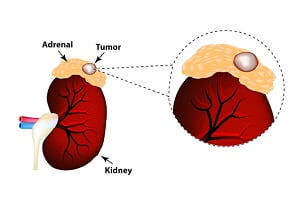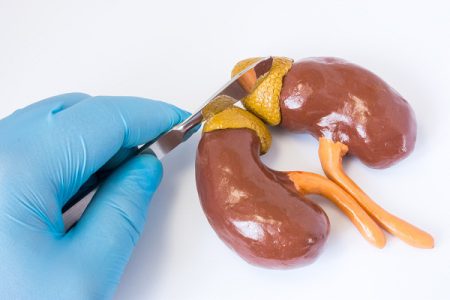Know About Stage 4 Adrenal Cancer
- Updated on: Jun 10, 2024
- 3 min Read
- Published on Apr 21, 2021

Adrenal cancer is not a common disease, and accounts for only 0.2% of deaths due to cancer. But it is not easy to diagnose this cancer in early stage. It tends to be highly malignant and is difficult to treat. About 50% of these tumors are silent and discovered only when they are quite large and produce localized abdominal symptoms or when they metastasize to other locations of the body.
What happens in a stage 4 adrenal cancer (cancer of adrenal glands)?
Patients in stage I have tumors that are about less than 5 cm in size and have no evidence of lymph node involvement or metastases. Patients in stage II have tumors that are larger than 5 cm but the cancer has not spread to the lymph nodes or metastases. Patients in stage III have tumors of any size with local lymph node involvement or local recurrence.
Patients in stage IV adrenal cancer have metastases to distant locations such as other organs, tissues, and lymph nodes. Stage IV adrenal cancer means that the tumor can be of any size, and the tumors have spread throughout the body.
Where does adrenal cancer spread in late stages?
The most common sites of adrenal tumors to spread in stage IV are:
- Lung (Read about lung cancer)
- Liver (Read about liver cancer)
- Lymph nodes
- bone (Read about bone cancer)
Stage 4 adrenal cancer life expectancy and survival rate
The stage of an adrenal cortical carcinoma (or adrenal cancer) defines prognosis for life expectancy and survival rate.
About 50% of patients in stages I, II or III are alive 40 months after diagnosis. But for stage IV adrenal cancer, only 10% of the patients are alive for the same time.
The effectiveness of treatment therapies for adrenal cancer is generally poor but there are a many patients on whom therapy can improve life expectancy with acceptable levels of side effects. But, there are high chances of cancer recurrence even after long periods of remission.
In a research study of close to 50 patients with adrenal cancer, surgical excision was found to provide the best prolonged survival. More than 40 % of patients were alive with no evidence of the cancer for an average of 7+ years after the surgery.
More: Adrenal Cancer And Adrenal Tumors: Causes, Signs, Symptoms, Diagnosis, Prevention, Treatment, Stages
Is stage 4 adrenal cancer curable?
Adrenal cancer usually affects adults, and the median age at the time of cancer diagnosis is about 43 years. Though it is curable in early stages, but only 30% of these malignancies are confined to the adrenal gland at the time of diagnosis. They usually have spread far beyond the original site when the cancer is usually not curable.
Treatment possibilities for late stage cancer:
Various treatments are available for patients dealing with cancer in different stages, such as surgery, radiation therapy, systemic chemotherapy and mitotane, etc.
Usually, adrenal cancers are diagnosed in later stages. By this time, the cancer has already grown into the nearby organs and tissues. It is often necessary to remove the adjoining kidney along with the tumor because the tumor invades its upper region.
If it is possible to remove all of the cancer, then surgery is done. But if the cancer has spread to other parts of the body, it cannot be cured with surgery alone in most cases. Some doctors still prefer to do surgery to remove the tumor as much as possible. This is called debulking. This may help reduce symptoms to some extent. Radiation therapy may also be used to treat areas that are causing symptoms. Chemotherapy (chemo) drugs may also be used.
If there is a liver metastases, a resection of the involved part of the liver has to be removed. Your surgeon may consider excising the entire visible tumor because it may increase life expectancy.
Mitotane is an adrenal-destroying drug with limited activity on the adrenal cortex. According to research, it has been found to be effective in inducing a tumor response in some patients who received its treatment.
Early treatment with mitotane following surgical resection is also found to increase life expectancy in stage 4 adrenal cancer. However, larger prospective clinical studies are needed to evaluate effectiveness of combination therapy.
Systemic chemotherapy has been found to show a response in less than 10% of patients who were treated for stages III and IV adrenal cancer.












